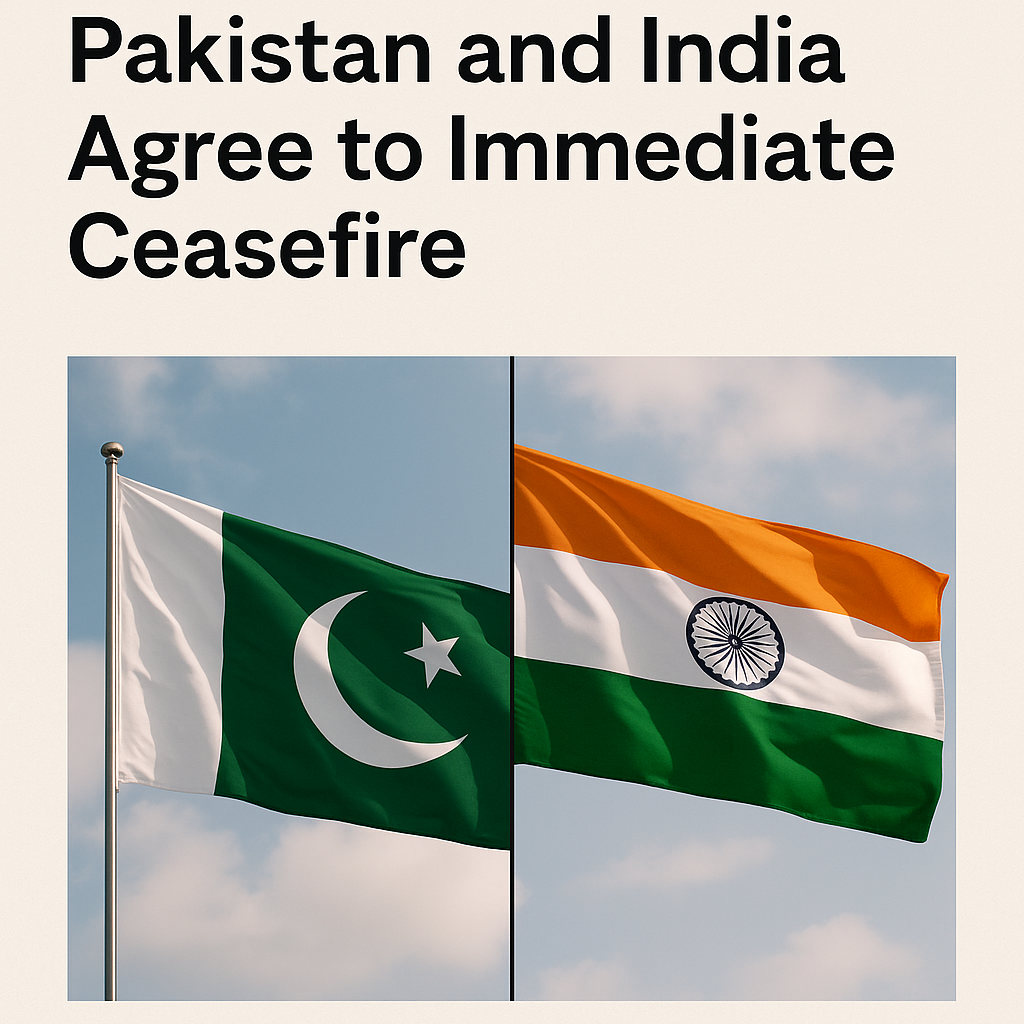Author: Naeem Chitta

In a significant development for South Asian peace, Pakistan and India have mutually agreed to an immediate ceasefire along the Line of Control (LoC) and other contested areas. This landmark decision, while sudden, reflects the urgent need to prevent further escalation and to restore regional stability. From Pakistan’s perspective, this ceasefire is not just a diplomatic gesture—it is a strategic necessity rooted in our commitment to regional peace, civilian safety, and the principle of responsible state behavior.
Background of the Tensions
The last few months witnessed heightened tensions between the two nuclear-armed neighbors. Exchange of artillery fire, cyber skirmishes, and diplomatic blame games had created a volatile atmosphere. Pakistan maintained a defensive posture throughout, reiterating its long-held stance that peace in South Asia cannot be achieved through aggression but only through dialogue, justice in Kashmir, and mutual respect.
During this period, both nations experienced internal and external pressures—India faced criticism over its internal unrest and controversial policies in Kashmir, while Pakistan called for international mediation and adherence to international law.
Pakistan’s Diplomatic Victory
The announcement of a ceasefire is viewed within Pakistan as a diplomatic success. Islamabad consistently advocated for restraint, mutual disengagement, and peaceful resolution of disputes. Pakistan’s Ministry of Foreign Affairs reaffirmed the importance of the 2003 ceasefire agreement and urged India to respect the human rights of Kashmiri civilians.
This ceasefire also reflects the effectiveness of Pakistan’s “peace through strength” policy—maintaining robust defense preparedness while keeping diplomatic channels open. Our armed forces have shown professionalism and restraint, even in the face of provocation, emphasizing Pakistan’s desire for de-escalation.
Impact on Civilians and Humanitarian Concerns
One of the most important outcomes of the ceasefire is the immediate relief it offers to civilians living along the LoC. Frequent shelling had forced families to flee their homes, schools to shut down, and livelihoods to be lost. Pakistan has always prioritized the protection of its people and highlighted the human cost of conflict.
The ceasefire brings hope for uninterrupted daily life, revival of trade routes, and reduced fear among border communities. It also provides an opportunity for humanitarian organizations to operate without the constant threat of conflict.
The Way Forward
From a Pakistani perspective, the ceasefire must not be treated as a temporary pause but as the first step toward a lasting peace. Pakistan calls upon India to:
- Respect the rights of the Kashmiri people and initiate genuine political dialogue.
- End the use of force in occupied territories and release political prisoners.
- Reopen and normalize trade, people-to-people contact, and confidence-building measures (CBMs).
Pakistan remains committed to peace, guided by the vision of Quaid-e-Azam Muhammad Ali Jinnah and the principles of the UN Charter. Dialogue, not domination, is the only path to true stability in South Asia.
The recent ceasefire reflects not only a cooling of tensions but also a critical opportunity. As Pakistanis, we view this as a moment to reaffirm our commitment to peace, justice, and regional cooperation. Let this ceasefire be the foundation upon which a more secure and respectful South Asia is built.
Absolutely right 👍
ylmkkuzelefxsmmzznojhunnvdyrlu
jshkrwgynkrqqzxhhxflvfdxxwwwpi